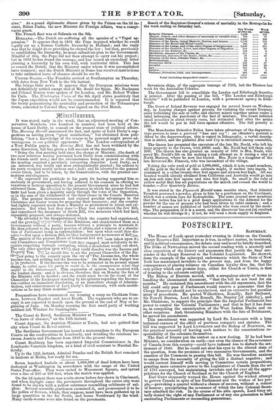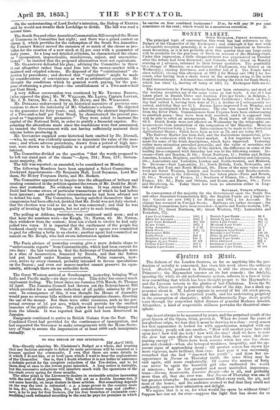POSTSCRIPT.
SATURDAY.
The Rouse of Lora Spent yesterday evening in debate on the Canada Clergy Reserves Bill. Important as it was, in subject matter, in treatment, and in political consequences, the debate may and must be briefly described. The Duke of NEWCASTLE moved the second reading with a masterly and close exposition of the history and arguments that. justify the. final sur- render of the Clergy Reserves to the Colonial Legislature. He showed, from the example of the episcopal endowments which the State of New. York has maintained inviolate to the present day, and from the happy consequences of placing reliance on Canadian loyalty thus far, that the only policy which can promise hope,. either for Church or Union, is that of trusting to the colonists outright. The Bishop of EXETER moved, with a scrupulous nicety of terms-in handling the abominated document, "that the bill be not read for six. months." He sustained this amendment with the old arguments, that the. bill could only pass if Parliament. would reserve a guarantee that the Clergy Reserves should not be secularized, and an extensive but peculiar array of precedents. He quoted Wilberforce, B.omilly, Earl Bathurst, Sir Powell Buxton, Lord John Russell, Mr. Stanley Iof Alderley], and Mr. Gladstone to supportthe principle that the Imperial Parliament has power to control the Colonial Parliaments ; and that in fact it has done so, in compelling the emancipation- of the West Indian Blacks and on other occasions. And, threatening Ministers with the fate of Belshazzar', he moved his amendment.
This amendment was supported by Lord ST- DEONARDS with a long technical examen of the effect of previous compacts and statutes. The- bill was supported by Lord Lwrreninie, and the Bishop of Noawien, on the practical necessity of leaving such matters to the conscientious re- sponsibility of the colonists themselves. The Earl of DERBY put.the contest on a new footing. If he had been Minister, no consideration on earth,-.not even the chance of the-severance of Canada from this country—could have induced him to disturb the set- tlement of 1840. But he could.not shut his eyes to the altered state of the question, from the promises of two successive Governments, and the sanction of the Commons in passing this bill. He was therefore anxious to escape from the necessity of giving the bill a distinct negative; and would content himself with moving in Committee certain propositions, granting more extensive power to the Legislature. of. Canada than the-act of 1791 conveyed, but maintaining inviolate and for ever alLthe appro- priations for the Church of Scotland or for the Church of England. Earl GREY eloquently warned the House against the wicked attempt to govern Canada in spite of her Parliament and the wishes of her peo- ple,—provoking a quarrel without a chance of success, without a retreat of honour • precipitating the severance of which the late, Colonial Secre- tary admitted the risk In-the-course of his. able speech, Lord Grey ut- terly denied the- right of any Parliament or of any. one generation to bind- succeeding Parliaments-or succeeding generations. On the understanding of Lord Derby's intention, the Bishop of EXETER. said he would not trouble their Lordships to divide. The bill was read a second time.
The South Sea and other Annuities Commutation Billoccupied the House of Commons in Committee last night; and there was a grand contest on clause 2, which provides for the redemption of the South Sea Annuities. Sir Frarzaor KELLY moved the omission of so much of the clause as pro- vides for the creation of a new stock at 24 per cent with a guarantee of forty years. In a long and detailed criticism, he characterized the clause as inconsistent, impracticable, mischievous, unjust, and unconstitu- tional": he insisted that the proposed alternatives were not equivalents. Mr. GLADSTONE defended his plan ; advising the Committee to throw it out altogether rather than send him into the money-market with a maimed and crippled scheme. He disposed of the "constitutional" ob- jection by precedents ; and showed that "equivalents" might be made by considerations of convenience as well as arithmetical equations. He thought the conditions which he grunted worth paying, for the pur- pose of attaining a great object—the establishment of a Two-and-a-half per Cent Stock.
A very diffuse conversation was continued by Mr. Thomas Ranee, ( who opposed the plan,) Mr. W.. WILLIAMS, Mr. Lszsio, Captain LAPPAN, Mr. J. B. SMITH, Mr. J. A. SMITH, Mr. Hintz, and Mr. WILKINSON.
Mr. DISRAELI endeavoured by an historical narrative of previous con- versions to show the inferiority of Mr. Gladstone's scheme. He objected to the guarantee for forty years; and, admitting the abstract importance of a Two-and-a-half per Cent Stock, he characterized the present pro- posal as "ingenious but premature." They were asked to increase the capital of the National Debt, in order to gratify a financial caprice. Re- counting the alterations made since the resolutions were first announced, he taunted. the Government with not having sufficiently matured their scheme before producing it.
Mr. GOULEURN supplied some historical facts omitted by Mr. Disraeli, —who, he said, was evidently anxious to depreciate the value of the mea- sure;, and whose adverse precedents, drawn from a period of high inte- rest, were shown to be inapplicable to a period of unprecedentedly low interest.
The Committee (Raided on the question "that the words proposed to be left out stand part of the clause"—Ayes, 234; Noes, 175; Govern- ment•majority, 59.
The bill was reported ; as amended, to be considered on Monday.
The following Members have been appointed a Select Committee on Dockyard Appointments—Sir Benjamin Hall, Lord Seymour, Lord Ho- thaw, Sir Henry Ferguson Davie, and Mr. Beckett.
The Committee appointed to inquire into the allegations of bribery and treating contained in the petition against the return of Mr. Dodd for Maid- stone met yesterday. No evidence was taken. It was stated that Mr. Dodd had become aware of particular transactions of which he had before been ignorant ; and under these circumstances he had been advised not to defend his seat. The Committee, having satisfied themselves that no compromise had been effected, decided that Mr. Dodd. was not duly elected ; that the election was void so far as he was concerned; and that he was guilty of treating by his agents, hut not privy to such treating.



























 Previous page
Previous page